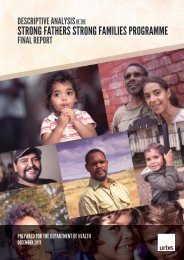Ending the Violence in Indigenous Communities
op152
op152
Create successful ePaper yourself
Turn your PDF publications into a flip-book with our unique Google optimized e-Paper software.
Lack of response prevents progress<br />
<strong>in</strong> embedd<strong>in</strong>g gender equity throughout our foreign policy, economic<br />
diplomacy and overseas aid programs. At a m<strong>in</strong>imum, DFAT aims to<br />
avoid exacerbat<strong>in</strong>g gender <strong>in</strong>equalities, and to ensure that women and<br />
men benefit from its <strong>in</strong>terventions equally. DFAT seeks to enhance<br />
women’s voices <strong>in</strong> decision-mak<strong>in</strong>g, leadership and peace-build<strong>in</strong>g,<br />
and at least 80% of its aid program <strong>in</strong>vestments needs to demonstrate<br />
real progress <strong>in</strong> address<strong>in</strong>g gender equality issues.<br />
If we, as Australians, can write <strong>the</strong>se provisions <strong>in</strong>to our foreign<br />
aid programs, why can we not do <strong>the</strong> same for our <strong>Indigenous</strong> affairs<br />
programs? I was surprised when I advised a senior government<br />
figure that fund<strong>in</strong>g agreements with Aborig<strong>in</strong>al organisations<br />
should be l<strong>in</strong>ked to a m<strong>in</strong>imum number of women on <strong>the</strong>ir boards<br />
and compulsory tra<strong>in</strong><strong>in</strong>g on m<strong>in</strong>imum standards of behaviour for<br />
community-controlled organisations. He said that this would not<br />
work because it is, and I quote, ‘not cultural’.<br />
I wonder whose culture he was referr<strong>in</strong>g to, because his brisk<br />
dismissal of my suggestion does noth<strong>in</strong>g but perpetuate a culture of<br />
thuggery and silence that offenders use to groom <strong>the</strong>ir victims and<br />
ma<strong>in</strong>ta<strong>in</strong> control to ensure <strong>the</strong>y are not brought to justice. Shouldn’t<br />
all Aborig<strong>in</strong>al or Torres Strait Islander women and children have <strong>the</strong><br />
same access and standards to protection from violence and justice<br />
as o<strong>the</strong>r Australians? What k<strong>in</strong>d of culture <strong>in</strong>sists that we imp<strong>in</strong>ge<br />
upon <strong>the</strong> rights of <strong>the</strong> <strong>in</strong>dividual to freedom from violence and sexual<br />
abuse? Because my culture certa<strong>in</strong>ly does not do this. The DFAT<br />
gender equity framework needs to be applied here, with<strong>in</strong> Australia,<br />
throughout all <strong>Indigenous</strong> affairs programs.<br />
The COAG 2016 National Summit on Reduc<strong>in</strong>g <strong>Violence</strong> aga<strong>in</strong>st<br />
Women and <strong>the</strong>ir Children recently launched its third action plan.<br />
While I support this document’s many practical measures and most<br />
of its focus, it fails to deliver for <strong>Indigenous</strong> Australians. Some of<br />
its language is soft on violence and excuses crim<strong>in</strong>al behaviour. It<br />
notes that responses to family violence <strong>in</strong> Aborig<strong>in</strong>al and Torres Strait<br />
Islander communities must recognise <strong>the</strong> impacts of traumas result<strong>in</strong>g<br />
from colonisation, racism and social disadvantage as <strong>in</strong>tersect<strong>in</strong>g<br />
factors <strong>in</strong> perpetuat<strong>in</strong>g violence.<br />
Yet as Dr Hannah McGlade has contended, any claim that <strong>the</strong><br />
16



